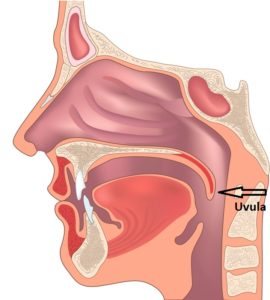What does your uvula do?
The uvula is the little fleshy part that hangs down from the soft palate of your mouth, and one of its purposes is to stop food from going up your nose when you swallow. Just like a tiny, repulsive doggy door, it swings up and down, blocking the path to your nose as the food races past, funneling it down into your esophagus.

Since ancient times, the uvula has been a subject of interesting and contradictory observations. People were asking: what’s that little thing dangling at the back of my mouth? On the one hand, it was regarded as having a functional role in speech and in immunology, but on the other hand it was regarded as a potentially hazardous organ, possibly responsible for sudden infant death syndrome (SIDS) and sleep apnea.
Researchers studied uvula and came to the conclusion that its function could be related to drinking while bending over. This assumption was that the uvula is a remnant from mammals that drink while bending their neck downward. In one study, the soft palate of eight different mammals was studied and compared. Of all animals in the study, a small underdeveloped uvula was found only in two baboons. Which gives you a bit of hint as to why we are basically the only animals that have them – they facilitate complex speech and allow us to make unique noises.
The origin of this word “uvula” is from Medieval Latin (14th century) and it means literally: a little grape, from Latin uva – a grape.
Five Possible Purposes of Uvula
I think our uvula does have multiple purposes, some of which may have yet to be discovered. However, research to date has uncovered several plausible reasons why humans have uvulas. This is a good summary (from Dr.Mercola’s website):
- To Keep Your Throat Lubricated
It’s known that your uvula has the ability to produce and secrete large quantities of thin saliva. When the uvula is surgically removed, some people even experience dryness in their throat as a result.
The inside of the uvula is packed full of glands that can quickly make large amounts of thin, watery saliva. These glands are connected to muscle fibers that run through the uvula, and when those muscles contract – for example, while you’re speaking or swallowing – more saliva is released.
Because the uvula’s shape allows it to swing around a lot, this means all that extra saliva can be spread around the throat more easily when you’re chatting or eating.
- An Accessory Organ of Speech
It’s been suggested that your uvula prevents excessively nasal speech and also is used to produce uvular sounds found in French, Arabic and some West African languages.
However, adding to the complexities, some research suggests removal of the uvula does not have a negative effect on speech. Figure that one out.
- Helping to Keep Food from Going Up Your Nose and a Drain for Mucus
Another theory suggests your uvula exists to block the path of food and liquid from going up your nose. It does this by sealing off the passageway between your throat and your nose (the nasopharynx), keeping food and liquid in the right place.
It’s this seal that may also help prevent an overly nasal-sounding voice, as it helps direct air and vocal vibrations out of your mouth instead of your nose.
In rare cases, some individuals do have a problem with this, a condition called velopharyngeal insufficiency, which, beyond potential issues like nasal regurgitation (bits of food and the like going up your nose when swallowing), results in the individual having difficulty saying consonants like ‘b’.”
It’s also been suggested that your uvula may help to drain and direct the flow of mucus secreted from your nasal cavities, helping it to flow toward the base of your tongue and down your throat.
- To Trigger Your Gag Reflex
If something touches your uvula, it will trigger your gag reflex, which causes a contraction at the back of your throat that thrusts objects forward and helps prevent choking. It could be that your uvula exists for this purpose, to help you expel any objects that are too large to swallow giving human an evolutionary advantage to survive.
Your uvula is one of only five parts of your body capable of triggering your gag reflex when touched. (The others are the roof of your mouth, the back of your tongue, the back of your throat and your tonsils).
- Immunological Importance
When researchers analyzed the frequency and distribution of immune cells in uvula tissue samples, they found the uvula may be a site for induction of mucosal tolerance to inhaled and ingested antigens.
Mucosal tolerance occurs only on mucosal surfaces and results in the suppression of your immune responses to inhaled or ingested antigens. The purpose is to prevent your body from launching an unnecessary immunological attack against harmless substances like pollen or foods.
Interestingly, your uvula also has its own protection against potential microbial pathogens, as researchers noted it contains a “subepithelial barrier of macrophages and gamma-delta T cells”.

Anatomy of the mouth and throat
In conclusion, I think uvula is a sophisticated structure, capable of producing a large quantity of fluid (saliva) that can be excreted liberally in a short time keeping things lubricated in your throat. Both uvula and speech serve to differentiate human beings from animals. It is possible that uvula is an accessory organ of speech, and may be another marker of human evolution that differentiates man from other mammals.